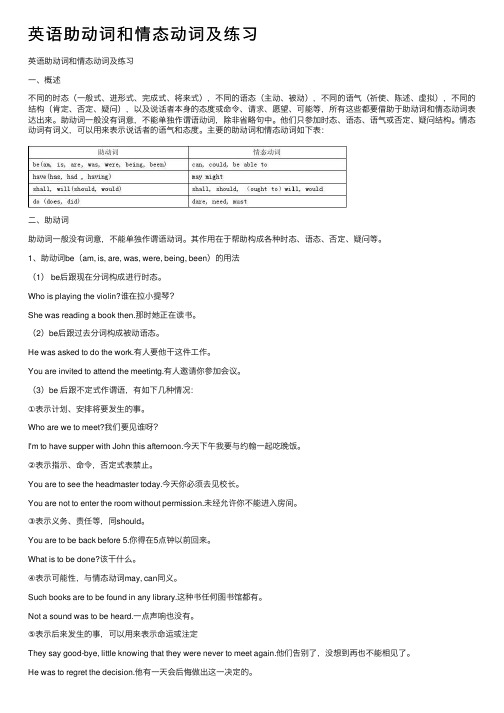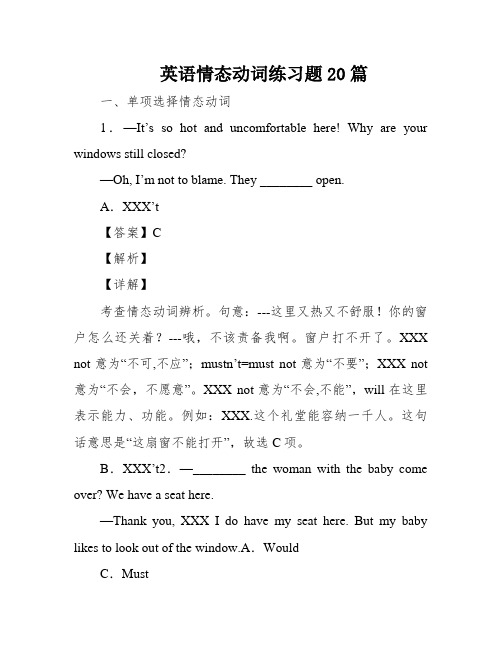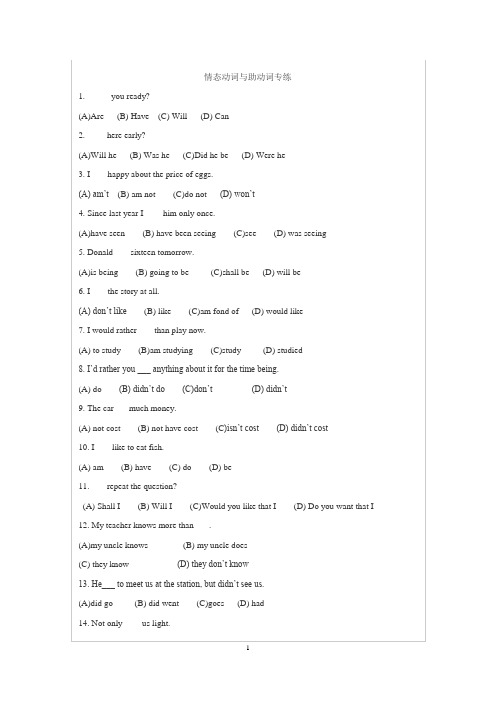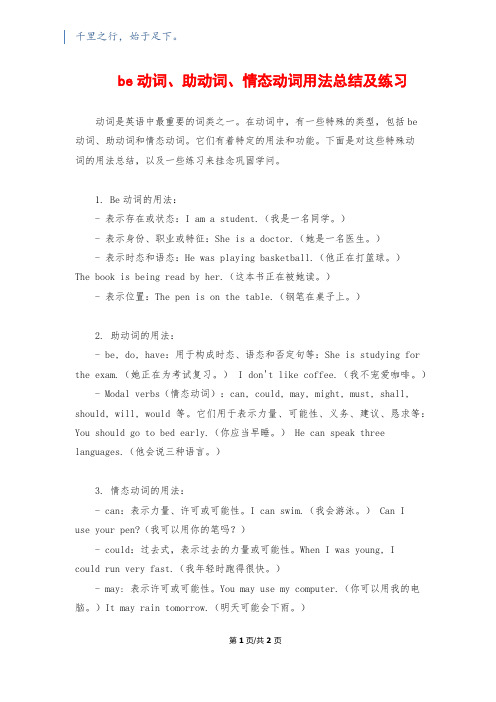助动词和情态动词专项练习专项强化练习
英语助动词和情态动词及练习

英语助动词和情态动词及练习英语助动词和情态动词及练习⼀、概述不同的时态(⼀般式、进形式、完成式、将来式),不同的语态(主动、被动),不同的语⽓(祈使、陈述、虚拟),不同的结构(肯定、否定、疑问),以及说话者本⾝的态度或命令、请求、愿望、可能等,所有这些都要借助于助动词和情态动词表达出来。
助动词⼀般没有词意,不能单独作谓语动词,除⾮省略句中。
他们只参加时态、语态、语⽓或否定、疑问结构。
情态动词有词义,可以⽤来表⽰说话者的语⽓和态度。
主要的助动词和情态动词如下表:⼆、助动词助动词⼀般没有词意,不能单独作谓语动词。
其作⽤在于帮助构成各种时态、语态、否定、疑问等。
1、助动词be(am, is, are, was, were, being, been)的⽤法(1) be后跟现在分词构成进⾏时态。
Who is playing the violin?谁在拉⼩提琴?She was reading a book then.那时她正在读书。
(2)be后跟过去分词构成被动语态。
He was asked to do the work.有⼈要他⼲这件⼯作。
You are invited to attend the meetintg.有⼈邀请你参加会议。
(3)be 后跟不定式作谓语,有如下⼏种情况:①表⽰计划、安排将要发⽣的事。
Who are we to meet?我们要见谁呀?I'm to have supper with John this afternoon.今天下午我要与约翰⼀起吃晚饭。
②表⽰指⽰、命令,否定式表禁⽌。
You are to see the headmaster today.今天你必须去见校长。
You are not to enter the room without permission.未经允许你不能进⼊房间。
③表⽰义务、责任等,同should。
You are to be back before 5.你得在5点钟以前回来。
英语情态动词练习题20篇

英语情态动词练习题20篇一、单项选择情态动词1.—It’s so hot and uncomfortable here! Why are your windows still closed?—Oh, I’m not to blame. They ________ open.A.XXX’t【答案】C【解析】【详解】考查情态动词辨析。
句意:---这里又热又不舒服!你的窗户怎么还关着?---哦,不该责备我啊。
窗户打不开了。
XXX not意为“不可,不应”;mustn’t=must not意为“不要”;XXX not 意为“不会,不愿意”。
XXX not意为“不会,不能”,will在这里表示能力、功能。
例如:XXX.这个礼堂能容纳一千人。
这句话意思是“这扇窗不能打开”,故选C项。
B.XXX’t2.—________ the woman with the baby come over? We have a seat here.—Thank you, XXX I do have my seat here. But my baby likes to look out of the window.A.WouldC.Must【答案】A【解析】【详解】考查情态动词。
句意:——那位抱小孩的女士,要不来这边吧?这儿有个坐位。
——谢谢,实践上我有坐位的,只是我的孩子喜爱看窗外。
XXX表示婉转的恳求,征求对方的看法,XXX提问一般只用于第一人称,我们常说Shall I.或者XXX;may表示恳求对方允许。
应选A。
【点睛】would的用法1.would最常见的用法是:相对于一个过去时间点的后来“将要”做什么,比如:He said XXX.他说他会在车站接我的。
这句中的would meet是相对于said(过去说)之后要做的事情。
又如:XXX she would have to ask someone for help.她当时想,她得找个人帮忙。
助动词和情态动词练习题

助动词和情态动词练习题1. You ____pay the money, but you ____do so at once.A. needn’t---mustB. need---needC. must—mustD. must---needn’t2. Comrade Wang _____be in Beijing because I saw him in town only a few minutes ago.A. mustn’tB. can’tC. may notD. isn’t able to3. The car plunged into the river. The driver _____get out but the passengers were drowned.A. was able toB. succeeded toC. couldD. might4. I ____the story at all.A. don’t likeB. likeC. like C. would likeD. would not like5. ____repeat the question?A. Shall IB. Will IC. Would you like thatD. Do you want that I6. “Do I have to get back this evening?”“No, you ____.”A. needn’tB. may notC. can’tD. must not7. He ____to meet us at the station, but didn’t see us.A. did goB. did wentC. goesD. had gone8. “Mr. Jones, _____you tell me what has happened?”A. mayB. mustC. mightD. could9. “That must be a mistake.”“No, it ____a mistake.”A. must not beB. needn’t beC. can’t beD. would not be10. If you ____me, I shall be very grateful to you.A. helpedB. will helpC. are helpingD. will be helping11. You ____to the meeting this afternoon if you have something important to do.A. needn’t to comeB. don’t need comeC. don’t need comingD. needn’t come12. It _____rain tomorrow. A. can B. must C. should D. may13. The wheels of history _____ not be turned back.A. canB. shallC. needD. may14. “Did they blame him for his mistakes?”“Yes, but they ____so.”A. would rather not doB. shouldn’t doC. shouldn’t have doneD. had better not do15. “Did your brother break the window?”“He ____have done it. I am not sure.”A. will notB. mightC. canD. must16. ____you be happy!A. MayB. CanC. mustD. Would17. You ____afraid of any difficulties.A. need not to beB. need notC. don’t needD. need not be18. The house is dark; the Turners ____to bed.A. should goB. should have goneC. must have goneD. must go19. ____open the door for you?A. Would IB. May IC. Will ID. Shall I20. Everyone _____do his best for the modernization of his country.A. canB. mayC. shouldD. had to21. My father _____such a thing.A. cannot have saidB. might not have saidC. couldn’t sayD. must not have said22. He went on foot, but he ____by bus.A. might as well goB. should goC. could have goneD. must have gone23. Come and lend me a hand, _____?A. do youB. can youC. will youD. shall you24. “Where are my keys? I ____them.”A. must loseB. should have lostC. can have lostD. might have lost25. Where _____wait for you?A. do you want meB. will IC. shall ID. would you hope me to26. The swimmer was very tired but he _____reach the shore before he collapsed.A. mightB. couldC. succeeded toD. was able to27. _____to you like that?A. How dared he spokeB. How dares he speakC. How dare he speakD. How dares he to speak28. Some people feel that firearms _____.A. need be controlledB. must have been controlledC. can be controlledD. should be controlled29. ____to have lunch with us today?A. Do you likeB. Would you likeC. Will you likeD. Shall you like30. You ____him that the day before.A. ought not to have toldB. must not have toldC. should not tellD. ought not to tell31. When I was a boy, I _____chocolate.A. would likeB. used to likeC. was used to likeD. should like32. “You missed a golden opportunity.”“Yes, I ____that job when it was offered.”A. must takeB. should have takenC. might have takenD. ought to take33. The story was so funny that she couldn’t help_____.A. laughingB. but to laughC. to laughD. not laughing34. When we reached the station, the train had still not arrived; so we ______.A. needed not to hurryB. needn’t have hurriedC. need not to have hurriedD. didn’t need to hurry35. Most of the people in the group felt rather disappointed at their traveling abroad. They say that it ____better organized.A. might have beenB. had beenC. had to beD. must have been36. My sister wasn’t in Paris last month, so you ____her there.A. might not have seenB. can’t have seenC. must not have seenD. shouldn’t have seen37. Mary keeps talking about the party. She had a very good time, _____she?A. hadn’tB. hadC. didn’tD. did38. Let’s go swimming, _____?A. will weB. do weC. don’t weD. shall we39. Your sister used to visit you quite often,____?A. didn’t sheB. hadn’t sheC. wouldn’t sheD. usedn’t she40. The man who was driving the truck would not admit that he had been at fault and _____.A. neither the other driver wouldB. neither would the other driverC. the other driver would neitherD. neither had the other drivers41. ____you prefer some iced tea?A. WillB. DoC. WouldD. Sha ll42. “Look what you’ve done! You ____more careful.”A. had to beB. should beC. should have beenD. must be43. You ____read that article if you don’t want to.A. mustn’tB. can’tC. shouldn’tD. needn’t44. I want to go to the grocery, but you _____with me.A. need not to goB. don’t need goC. not need to goD. need not go45. I wonder why they haven’t arrived yet. I told them how to get here but perhaps I ___them a map.A. should giveB. had to giveC. ought to have givenD. must have given46. You _____me because I didn’t say anything like that.A. must misunderstandB. may misunderstandC. could have misunderstandD. must have misunderstood47. No one _____that to his face. A. dares say B. dares saying C. dare say D. dare to say48. Dr. Jones, many students want to see you. _____they wait here or outside?A. DoB. WillC. ShallD. would49. “Do you believe that James will apologize to Mary?”“I don’t know. He____.”A. shouldB. wouldC. oughtD. will。
情态动词助动词专练

8. I’d rather you ___ anything about it for the time being.
(A) do(B) didn’t do(C)don’t(D) didn’t
9. The car___ much money.
49. You ___see him, but I must.
(A) haven’t(B) can’t(C) mustn’t(D) needn’t
50. To succeed in a difficult task, ___.
(A) one needs to work hard(B) to work hard is needed
(A)needn’t(B) may not(C)can’t(D) must not
18. Tell the boy that he ___ in the river.
(A) swims(B) swim(C) swimming(D) to swim
19. Joan___ play on Saturday.
(A) going to(B) can(C) is going(D) can to
20. Susan and I can go to the lecture ___.
(A) but neither can Charles(B) and so Charles can
(C)but Charles can’t(D)and Charles also can
(A) shall(B) must(C) should(D) need
33. ___ I have a talk with the Party Secretary now?
be动词、助动词、情态动词用法总结及练习

千里之行,始于足下。
be动词、助动词、情态动词用法总结及练习动词是英语中最重要的词类之一。
在动词中,有一些特殊的类型,包括be动词、助动词和情态动词。
它们有着特定的用法和功能。
下面是对这些特殊动词的用法总结,以及一些练习来挂念巩固学问。
1. Be动词的用法:- 表示存在或状态:I am a student.(我是一名同学。
)- 表示身份、职业或特征:She is a doctor.(她是一名医生。
)- 表示时态和语态:He was playing basketball.(他正在打篮球。
)The book is being read by her.(这本书正在被她读。
)- 表示位置:The pen is on the table.(钢笔在桌子上。
)2. 助动词的用法:- be, do, have:用于构成时态、语态和否定句等:She is studying for the exam.(她正在为考试复习。
) I don't like coffee.(我不宠爱咖啡。
)- Modal verbs(情态动词):can, could, may, might, must, shall, should, will, would等。
它们用于表示力量、可能性、义务、建议、恳求等:You should go to bed early.(你应当早睡。
) He can speak three languages.(他会说三种语言。
)3. 情态动词的用法:- can:表示力量、许可或可能性。
I can swim.(我会游泳。
) Can Iuse your pen?(我可以用你的笔吗?)- could:过去式,表示过去的力量或可能性。
When I was young, Icould run very fast.(我年轻时跑得很快。
)- may: 表示许可或可能性。
You may use my computer.(你可以用我的电脑。
be动词、助动词、情态动词用法总结及练习(答案)

助动词do/does
什么是助动词?
顾名思义,助动词就是帮助动词的,而本身没有 实际意义的动词,是具有雷锋精神的词汇。
助动词do的三种变化形式
do 第三人称单数时使用的does 过去式did
do的基本用法:
1 构成否定句 2 构成一般疑问句及回答 3 构成特殊疑问句
do的各种形式
肯定式:do 否定式:don't/do not do用在第一人称单复数、第二人称单复数和第三人称复 数作主语,且时态为一般现在时的句子,如:
4. shall的用法
1)shall常用于第一人称,表示简单的将来,构成将来时态。(助词)
ex: I shall think it over and let you know my idea.
When shall we meet again?
We shall have a good time in the park. 2) shall用于第一人称,还可以表示征求对方的意愿。
ex: My brother is ill, so I have to call the doctor in the middle of the night. 2) have to有人称、时态和单复数上的变化,而must只有一种形式。
have to → had to I have to/she has to
shall和will的对比
1)shall和will作为助动词可以与动词原形一起构成将来时。如: I shall study harder at English. 我将更加努力学习英语。 He will go to Shanghai. 他要去上海。
2)以前的语法中,shall用于第一人称,will只用于第二、第三人称。现在,尤其 是在口语中,will常用于第一人称,但shall只用于第一人称,如果用于第二、第三 人称,就不再有“将要”的意义,就变成命令、警告或威胁的意思了。
中考英语情态动词专项练习与解析
中考英语:情态动词强化练习100题第一部分:1-50 专题练习第二部分:51-100真题解析1.—Must I go to law school and be a lawyer like you,Dad?—No,you _____,son.You're free to make your own decision.A.can't B.mustn't C.shouldn't D.needn't 2.—You look very pretty, if I say so.—Thanks a lot for saying that.A.must B.may C.will D.have to 3.—I saw your mother in the library just now.—It ______ be her. She went to Beijing yesterday.A.can't B.mustn't C.needn't4.—I hear you've got a new watch. ______ I have a look?—Yes, you may.A.Do B.May C.Should D.Shall 5.You are supposed to bow when you meet someone from Korea.A.must B.should C.would D.can6.All passengers ______ go through safety check before they take a plane.A.can B.may C.must D.could 7.—Must I practice the violin right now?—No, you _____. You ______ do it later on.A.mustn't; may B.shouldn't; mightC.needn't; may D.needn't; must8.You ______ walk to close to the edge of the hill because you might fall and hurt yourselves.A.mustn't B.must C.can D.needn't 9.—Mum, I play football this afternoon?—Sure, but you finish your homework first.A.may; could B.can; must C.can; mustn't D.may; can't 10.—Could you go to the bookshop with me? I want to buy The Grass House by Cao Wenxuan.—Sorry, I . I've promised Mum to go home right after school.A.can't B.couldn't C.needn't D.mustn't 11.—Excuse me, sir, visiting hours are over. You leave.—Pardon me, nurse. I didn't hear the bell.A.may B.can C.must D.need 12.You take me to the station. My brother's taking me.A.can't B.mustn't C.shouldn't D.don't have to 13.2016•连云港)—Shall we take a car?—No, we . It's only five minutes' walk.A.can't B.mustn't C.needn't D.couldn't 14.— Finally, they came back.— They be hungry after such a long walk.A.can't B.must C.neednt15.— Sorry, Miss Liu. I left my workbook at home. Must I hand it in today?— No, you . You bring it here tomorrow.A.mustn't; should B.can't; mustC.mustn't; may D.needn't; can16.—Must I clean the room now?—No, you . You can do it later.A.needn't B.can't C.may not17.— Whose is this book written by Yang Jiang?— Carol's favorite writer is Yang Jiang. It be hers.A.mustn't B.must C.can't D.can 18.— What does Justin Bieber's song Never Say Never impress you most?— It tells us that we do almost anything if we never give up.A.can B.have to C.should D.need 19.You have already tried your best,so you _________ worry about the matter.A.can't B.needn't C.mustn't D.couldn't 20.I be a little bit slow, but at least I don't make foolish mistakes.A.should B.may C.must D.need 21.Chairperson Xi calls on us to do what we can ____ as much as possible.A.save B.to save C.saved D.saving 22.We __________ pay to get into the concert. It's free.A.can't B.mustn't C.might not D.don't have to 23.— Who's that woman? Is it Ms. Li?— It ______ be her. She has gone to Britain.A.may B.must C.can't D.mustn't 24.— _________ I take my cousin Shirley with us, Mr. Wu?— Yes, but we'll get there by bike. ____________ she ride a bike?— Yes, and she ___________ ride a bike when she was only six years old.A.Could; can; could B.Can; can; canC.Can; could; could D.Could; could; can25.— Is this e-dictionary Jack's?— No, it_______ his. His is much newer.A.can't be B.mustn't be C.may be D.should be 26.Whose pen is it? It____ Peter's. His name is on the cover.A.must B.might C.can't D.need 27.— Isn't that your new English teacher over there?— No, it ______ be her. She doesn't have long hair.A.can't B.must not C.won't D.may not 28.Is Mr. Smith in his office now?No, he there. I saw him in the library a minute ago.A.may be B.must be C.can't be D.won't be 29.— I saw Mr. Green at school this morning.— No, it _____ him. He flew to Canada last week.A.can be B.must be C.can't be 30.—Ann, are you hurrying out?—I __________ go now or I'll be late for the meeting.A.must B.can C.needn't D.don't have to 31.—That must be Mr. John.—No, it ________ be him. I saw him off at the airport half an hour ago.A.may not B.mustn't C.can't D.needn't32.—Must I give the dictionary back to the library now?—No, You _______. You can _______ it for another two weeks.A.needn't; know B.needn't; keep C.mustn't; lend D.mustn't; keep 33.—I can't stop playing computer games.—For your health, my boy. I'm afraid you _______.A.can B.may C.must D.have to 34.—Can I wear the coat to school, mom?—No, you can't. You _______ wear the school uniform, or your teacher will be angry.A.might B.must C.will D.can 35.—Must I give the dictionary back to the library now?—No, You _______. You can _______ it for another two weeks.A.needn't; know B.needn't; keep C.mustn't; lend D.mustn't; keep 36.—I can't stop playing computer games.—For your health, my boy. I'm afraid you _______.A.can B.may C.must D.have to 37.—Is Jessica giving us a speech this evening?—No, it _______ be her. She _______ to Japan.A.mustn't; has gone B.mustn't; has beenC.can't; has gone D.can't; has been38.—Can I wear the coat to school, mom?—No, you can't. You _______ wear the school uniform, or your teacher will be angry.A.might B.must C.will D.can 39.—Is Jessica giving us a speech this evening?—No, it _______ be her. She _______ to Japan.A.mustn't; has gone B.mustn't; has beenC.can't; has gone D.can't; has been40.—The man at the gate _______ be our headmaster. He is always standing there every morning.—No, it _______ be him. He is holding a meeting in the office now.A.must; can't B.must; mustn'tC.can't; can't D.can't; mustn't41.—The man at the gate _______ be our headmaster. He is always standing there every morning.—No, it _______ be him. He is holding a meeting in the office now.A.must; can't B.must; mustn'tC.can't; can't D.can't; mustn't42.—Look, Jim is talking to his friend under the tree.—It _______ be him. He has _______ back to Canada.A.can't; gone B.can't; been C.may not; been D.mustn't; gone 43.—Look, Jim is talking to his friend under the tree.—It _______ be him. He has _______ back to Canada.A.can’t; gone B.can’t; beenC.may not; been D.mustn’t; gone44.Finish your homework first,and then you'll watch TV for an hour.A.can B.be able to C.able to D.could 45.—— Must I be home before eight o'clock, Mum?—— No, you . But you have to come back before ten o'clock.A.mustn't B.can't C.needn't D.couldn't 46.— Must I do the rest of the work today?— No, you finish it tomorrow.A.must B.can C.needn't D.can't 47.—Anna, must I return the book to you today?—No, you . You can read it for another two days.A.mustn't B.can't C.needn't D.shouldn't 48.—Are you going to Beijing by plane?—It's fast, but expensive. So I am not sure. I take a train.A.should B.may C.must D.will 49.—What time will we arrive there?—You had better 8 o'clock.A.be supposed to B.should C.can D.shall 50.—Is the man over there Mr. Miller?—It ______ be him. He has gone to Shanghai on business.A.might B.must C.can't D.mustn't答案解析部分1.D2.B3.A4.B5.B6.C7.C8.A9.B10.A11.C12.D13.C14.B15.D16.A17.B18.A19.B20.B21.B22.D23.C24.A25.A 26.A 27.A 28.C 29.C 30.A 31.C 32.B 33.D 34.B 35.B 36.D 37.C 38.B 39.C 40.A 41.A 42.A 43.A 44.B 45.C 46.B 47.C 48.B 49.A 50.C中考英语:情态动词强化练习100题第一部分:1-50 专题练习第二部分:51-100真题解析1.Only plants and animals that need very little water __________live in a desert.A.can B.need C.must全面解析:只有需要很少水的植物和动物才能在沙漠中生活。
情态动词专项练习及答案
情态动词专项练习及答案情态动词是英语语法中非常重要的一部分,它们有助于表达某件事的可能性、意愿、推测、建议、能力等等。
但是,由于它们的用法有一定的复杂性,学习者经常会感到困惑。
因此,需要通过大量的练习来加强对情态动词的理解并提高写作和口语能力。
以下是一些情态动词的练习题及答案,供大家参考:练习题:1. 我们_____考虑去参观博物馆。
(should, could, would)2. 你_____办理一张信用卡吗?(can, may, must)3. 他明天_____会开会。
(will, may, can)4. 我想他现在_____在办公室里工作。
(must, should, could)5. 他们_____飞去巴黎度假。
(might, shall, would)答案:1. should3. will4. must5. would练习题:1. 您_____请稍等,我们的服务员马上就到。
(should, could, would)2. 他_____年底前学会说流利的法语。
(must, will, can)3. 他们_____在火车站见面。
(shall, will, would)4. 这道数学题很难,你_____得仔细看看。
(must, should, could)5. 我们_____在百度上搜索一下。
(may, must, can)答案:1. could2. must4. should5. can练习题:1. 昨天我_____已经完成了报告。
(should, could, would)2. 你_____面试时需要带什么材料?(can, may, must)3. 他们_____永远不会忘记这个美好的夜晚。
(could, will, would)4. 我们_____向老板提出这个想法。
(might, should, would)5. 他_____有可能是个外星人。
(might, shall, would)答案:1. could2. must3. will4. should5. might练习题:1. 如果你有空,你_____陪我去购物吗?(should, could, would)2. 他_____天晚上不会来参加聚会。
助动词与情态动词讲解及练习题
助动词与情态动词一、助动词助动词有be, have, do, will, shall。
它们本身没有词义,只和实义动词的一定形式构成复合谓语,用来表示时态和语态,构成否定、疑问及加强语气等。
1、be (am, is, are, were, been)(l)“be + -ing”构成进行时态;(2)“be + 过去分词”构成被动语态;(3)“be + 动词不定式”构成复合谓语:①表按计划安排要发生的事。
The prime minister is to visit Japan next year.总理将于明年访问日本。
②用于命令。
You're to do your homework before you watch TV.你得做完了作业才能看电视。
2、have (has, had)(1)“have+过去分词”构成完成时态。
如:Have you seen the film ?(2)“have been + -ing”构成完成进行时态。
如:What have you been doing these days? 这些日子你一直在干什么?3、do (does, did)(1)“do not + 动词原形”构成行为动词的否定式。
如:His brother doesn’tlike playing basket.;(2)“Do + 主语 + 动词原形”构成行为动词的一般疑问句。
Does he go toschool by bike every day? (3)“do + 动词原形”用于祈使句或陈述句中表示加强语气。
如:I did go to see him, but he wasn’t in我确实去看望他了,但他不在家。
Do do some work. 请一定做点什么;(4)代替前面刚出现的动词以避免重复。
My mother told me to go to bed early.So I did.4、will, shall (would, should)“will (shall+动词原形)”构成一般将来时,一般来说,shall用于第一人称,will用于第二人称或第三人称,口语中常用will代替shll,如:We will have a meeting to discuss the problem.二、情态动词情态动词表示说话人对某一动作或状态的态度,可以表示“可能”、“可以”、“需要”、“必须”或“应当”等之意。
情态动词详解(含练习题100道和答案)
情态动词的用法及专项练习第1 & 2类:第3类:1.could have p.p.①指过去某事有可能发生, 但并未.真的..发生。
They could have won the race, but they didn't try hard enough.He could have studied harder, but he was too lazy and that's why he failed the exam.②指过去有能力做某事, 但并未真的...做过。
I could have stayed up late, but I decided to go to bed early.Julie could have bought the book, but she borrowed it from the library instead.③对过去的发生事情做出一种猜测,但实际上并不知道真假。
仅仅是做一种观点上的表达。
He could have got stuck in traffic.He could have forgotten that we were meeting today.He could have overslept.2. may / might have p.p.(用法与could have p.p.第③点相同)对过去的发生事情做出一种猜测,但实际上并不知道真假。
仅仅是做一种观点上的表达。
He might have got stuck in traffic.He might have forgotten that we were meeting today.He might have overslept.3. couldn't have p.p.渴望、期望做某事, 但由于外部原因不可能做成, 即便是很想做。
是一种虚拟语气。
I couldn't have arrived any earlier. There was a terrible traffic jam (= it was impossible for me to have arrivedany earlier).He couldn't have passed the exam, even if he had studied harder. It's a really, really difficult exam.4. should / ought to have p.p.有一个好主意,该做而没有做。
- 1、下载文档前请自行甄别文档内容的完整性,平台不提供额外的编辑、内容补充、找答案等附加服务。
- 2、"仅部分预览"的文档,不可在线预览部分如存在完整性等问题,可反馈申请退款(可完整预览的文档不适用该条件!)。
- 3、如文档侵犯您的权益,请联系客服反馈,我们会尽快为您处理(人工客服工作时间:9:00-18:30)。
助动词和情态动词专项练习部分情态动词: 能can, could; 可能may,might;必须must, have to(不得不)应该should, will(将要/会)能够would, shall注意:情态动词后接动词原形一、情态动词的基本用法⒈Can John Smith ______ his homework on time?A. finishB. finishesC. finishingD. finished⒉She dare ______ out by herself at night.A. go notB. not to goC. to not goD. not go⒊You ______ to the party tonight if you have something important to do.A. don’t need comeB. needn’t to comeC. needn’t comeD. don’t need coming⒋—We’ll be ready to leave at eight.—Well, John must ______ back by then.A. beingB. isC. beD. to be⒌Your grandmother ______ the newspaper without glasses.A. can still readB. cans still readC. still can readsD. can still reads⒍—Must I ______(起床)early tomorrow, Dad?⒎—Must we ______( 读) the book today?⒏You cannot ______(玩)on the road. It’s dangerous.⒐You need not ______( return) the book now. You can (keep) it until next week. ⒑I ______ a sleeping bag because I have.A. needn’t haveB. didn’t haveC. don’t needD. need not⒒Mr Smith ______ a pen from Jack.A. must to borrowB. had borrowedC. must borrowedD. had to borrow二、can, could, may, might的用法⒓The man can’t ____ (走路)fast because he is lame in the right foot. ⒔—Could I borrow your dictionary?—Yes, of course you ______.A. willB. wouldC. mustD. can⒖—That ______(一定是)a mistake.—I don’t think so. It ______ (不可能是)a mistake.A. may be notB. needn’t beC. cannot beD. must be三、should, would, shall, will的用法16.—Must I copy(抄写)the new words in class?—No, you ______. You ______ do it at home.A. needn’t, mayB. mustn’t, mustC. mustn’t, mayD. needn’t, mustn’t17.—Would you please not draw pictures on the wall?—Sorry. I ______ it again.A. am not doingB. don’t doC. didn’t doD. won’t do18.______ I open the window? It’s so warm here.A. ShallB. WillC. WouldD. Must19.“Do you think we ______ to school?” Jane asked.A. should to goB. should goingC. should goesD. should go二、助动词专项训练助动词: do , does,did + 动词原形1、She ________ to see documentaries(记录片).A、do wantB、don't wantC、doesn't wantD、not want2、Look at that picture on the wall. __________ you like it?A、DoB、CanC、CouldD、Are3、He ________ like pears.A、doB、isC、doesn'tD、not4、—Do you often go to the cinema______ Sunday?—No, we__________.A、on, don'tB、on, aren'tC、in, doD、in, don't5、-Can you see a light on the table?-Yes, ________.A、I amB、I’m notC、I canD、He isn’t6、—Does the boy want to be an actor? —________.A、Yes, he isB、No, he doesC、Yes, he doesD、No, he isn't7、_________ he have any apples ?A、DoB、DoesC、IsD、Are8、She ______ want to be a policewoman, because she thinks it’s kind of dangerous.A、isn’tB、aren’tC、don’tD、doesn’t9、Why____he have brown hair?A、doB、doesC、isD、has10、What time__________ he get home every day?A、isB、doesC、doD、am11、What________ you see in the picture?A、isB、areC、canD、have12、Jack_______ like flying kites______ throwing a frisby.A、don't, orB、doesn't, andC、don't, andD、doesn't, or13、A:________ Jim ________ a ball?B:No, he________.A、Do, have, don'tB、Does, has, doesn'tC、Is, have, isn'tD、Does, have, doesn't14、I ________ have a watch.A、am notB、doesC、don'tD、doesn't15、____you____a good time on your vacation?A、Did; haveB、Did; hadC、Were; haveD、Were; had16、Simon likes _____ football, but he doesn’t _____ it well.A、play, playsB、to play, playsC、plays, playingD、playing, play17、She____have to wash the dishes now.A、don'tB、notC、doesn'tD、can't18、—________Colin ________ Chinese history? —Yes, he does.A、Do; likeB、Does; likesC、Do; likesD、Does; like19、Li Lei ______ lunch at home.A、hasn’tB、haven’tC、don’t haveD、doesn’t have20、-Who cleaned the blackboard yesterday, Dick? -John___.A、cleanedB、doesC、didD、is21、__________ you usually come to school by bike?A、Don'tB、Doesn'tC、Aren'tD、Isn't22、-Where______lions come from? -I think they come from Africa.A、areB、isC、doesD、do23、__________ we have any eggs?A、Aren'tB、Don'tC、Can'tD、Mustn't24、____you on your vacation yesterday?A、AreB、WereC、WasD、Did25、-Who____dinner last night? -My mother____.A、cooked; didB、did; cookedC、did; didD、cooked; cooked。
